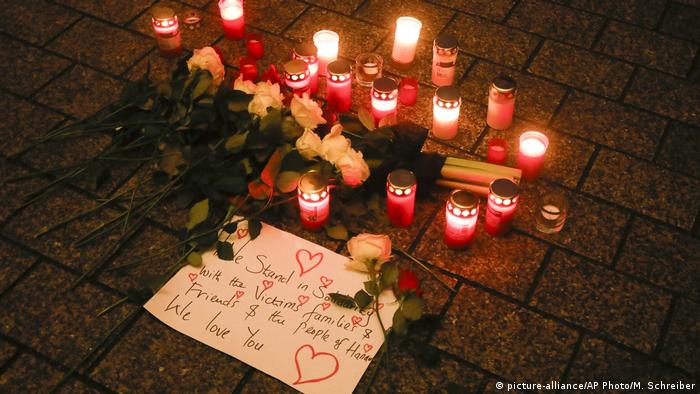[ad_1]
We now know that Tobias R., the person behind Wednesday’s bloody terror assault in Hanau, western Germany, disseminated racist, xenophobic on-line movies. These, and his so-called manifesto, echo a few of the far-right conspiracy theories circulating on the net at the moment. He’s evidently one of many many people who was radicalized on-line.
A 2019 evaluation by Germany’s home intelligence company states that it struggles conserving observe of extremist lone wolves. A lot of them, it claims, are radicalized not by participating with identified far-right teams, however on their very own. Final summer time, the company subsequently launched a activity drive to watch extremist conduct on social media to counter the specter of on-line radicalization.

On-line radicalization can result in lethal assaults, such because the one within the German city of Hanau.
Far-right scene extremely lively on-line
The Berlin-based Amadeu Antonio Basis, which works to counter far-right extremism, additionally believes that people can simply develop into radicalized through the web. Miro Dittrich, who oversaw a two-year examine of extremist social media content material, says there’s “a community of on-line content material that appeals to totally different goal teams that lures them into an alternate (extremist) world.”
Learn extra: Germany publicizes plans to fight far-right extremism and on-line hate speech
He says for the reason that beginning of the web, far-right activists had discovered, although “trial and error,” to border and curate content material to enchantment to radicals. Dittrich says these activists have been fast to experiment with and undertake new on-line platforms, in addition to to generate revenue, for example although YouTube adverts, donation drives and crowdfunding campaigns. He argues that more and more, social media customers are networking and speaking with one another on “darkish social,” which is tough to watch.
Messenger apps and social media can assist radicalization
There are quite a few components, in accordance with the Amadeu Antonio Basis examine, that enhance the danger of on-line radicalization. One in all them is YouTube’s autoplay algorithm, which, though it has been toned down considerably, tends to advertise divisive content material.
One other is the flexibility to create a bunch chats with 200,000 people on the Telegram messenger service. WhatsApp, in contrast, limits such chats to 256 individuals at most. The Telegram app additionally permits person to seek out different, close by customers. Each options can present a giant platform to unfold extremist content material.
Learn extra: Germany and right-wing extremism: The brand new dimension of terror
The examine additionally reviews that extremists on Instagram have begun spreading their ideology by linking them to standard hashtags. The Identitarian Motion particularly, it states, has began disseminating far-right extremist content material although seemingly innocuous footage of events and sports activities occasions. Furthermore, extremists have begun creating their very personal on-line platforms which successfully shut out anybody who doesn’t share their worldview. This echo chamber, the examine finds, emboldens them of their considering. A lot of those that collect on these platforms, the examine says, think about themselves modern-day crusaders, who should save the “Western world.”
Poisonous narratives
The examine reviews that poisonous narratives, such because the one claiming Germans are being displaced by foreigners, can and do unfold with ease on-line. As customers come throughout extra doubtful on-line content material that confirms such narratives, they really feel more and more underneath menace and develop into open to radical options.
Learn extra: Shield our children on-line, German mother and father demand
The examine reviews that far-right milieus in numerous nations are utilizing the web to attach with one another. On well-known extremist platforms, English is the lingua franca. And much-right terrorists, it states, study and drawn inspiration from one another, thereby motivating others to commit related crimes.
Ever since Anders Brevik’s 2011 terror assault, it has develop into widespread for right-wing extremist terrorists to depart behind a manifesto. And for the reason that 2019 Christchurch assaults, many extremists have livestreamed their crimes. The examine reviews that by broadcasting their acts, such terrorists search to draw media and on-line consideration. And whereas they appeared “like lone wolves,” they’re in actuality linked to a broad community of like-minded radicals.
Each night, DW sends out a number of the day’s information and options. Enroll right here.
[ad_2]









